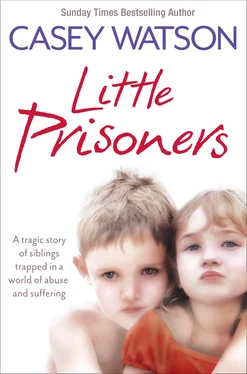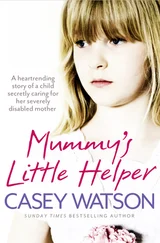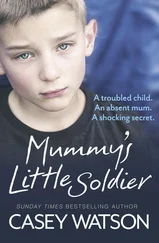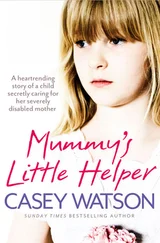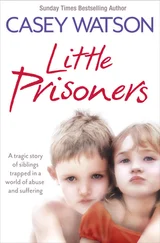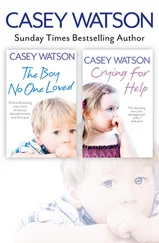And we were soon to get a stark reminder of just how much they did need. Our return, and the opening of all our carrier bags, was greeted not with joy, whoops of delight and barely contained excitement, but instead with blank faces and disinterest. Yes, they were both polite, and said thank you – and to both me and Riley – but as for interest in the toys and games and books we had bought them – there was none. They looked for all the world as if they didn’t even want them. Such a sad and dispiriting thing to witness.
The cars rolled up at 2 p.m. as planned, for our promised meeting. Anna and Robert were in the first car, while John, who’d obviously travelled separately, was behind.
By now we’d given the children lunch (happily, now they were dosed up, a much less manic affair than breakfast) and they were sitting in the living room, glued to the TV. So I left them to it, and while Mike organised teas and coffees for everyone, ushered our three guests into the dining area of the kitchen. I smiled to myself as Mike grandly placed the matching milk jug and sugar bowl on the table. I’d only acquired them recently, specifically for the purpose of these meetings, having never been someone who’d have owned such things before. I remembered my mum’s comment when she’d first clocked them in my kitchen cupboard. ‘Ooh, check you out, Casey!’ she’d teased. ‘All this posh crockery! You know you’ve made it when you own a milk jug and sugar bowl! Just don’t be getting too big for your boots, now!’
We’d both laughed. We were definitely not a family for airs and graces. But if I was going to be hosting meetings for all these social services professionals, I felt I needed to smarten up my act on the china front a bit. Ironic really, when you thought about what most of the meetings were about.
Hellos all done, and Anna and Robert having formally introduced themselves to John, this one kicked off without any delay. Straight away I could sense a bit of tension in the air, though I had yet to find out what the cause was.
John got started. ‘Right, then,’ he said. ‘Two things I need to know. First, some more background on the family and the situation and, second, the length of the placement. Mike and Casey –’ he glanced at us here – ‘are a valuable resource on my team and, as I’m sure both of you appreciate, this temporary placement with them is a favour. But one, as I’m sure you know, that we can’t extend indefinitely.’ Straight to the point, no messing around. That was John. I looked at the other two, now shifting uncomfortably in their seats. I wondered what it was we were about to hear.
‘I’ll try to answer your questions as honestly as I can, John,’ Anna answered. ‘I do realise that this is a lifeline you’ve thrown us, and we appreciate it.’ She smiled ruefully at me. ‘And we know it’s above and beyond the call of duty.’ She started shuffling among her pile of paperwork, and pulled out some pages. ‘Okay,’ she continued. ‘So the family first came to our attention some eight years back. At that time Ashton, of course, was the only child. Karen and Kevin Wardhill – the parents – both have learning difficulties, as you know, and apparently Kevin’s cousin, Sue, was the one to make a complaint to us, saying that they were neglecting the baby. Forgetting to feed him, going out and leaving him unsupervised – things like that. So we intervened, but the report from the social worker was unequivocal. Ashton was deemed both happy and healthy, and that, therefore, was pretty much that.’
I interrupted. ‘But surely, if it was the father’s own cousin who was worried …’
Anna shrugged. ‘The report’s clear. At that time, her fears were deemed to be unfounded. And you never know what people’s motivations are, of course … But the plot thickened, as they say, because she then went to the police a year later and reported that her cousin – this being Kevin again – had sexually abused her from a young age. This time, of course, the police demanded action. Given her new allegations about her cousin, we agreed it would be prudent to keep a regular eye on both Ashton and any further children.’
‘And?’ asked Mike.
‘And the cousin then retracted the sexual abuse story – I have no information about the circumstances – but we were now, of course, involved. And the seeds had already been sown.’
I thought about how much time had passed – and how many offspring were now involved. This was turning into quite an epic. ‘And then what?’ I said. ‘They had four more children, and you say social services have been involved since Ashton was a baby? So how did we get from there to here?’
Anna cleared her throat. She looked embarrassed. And seeing her expression made me sure that we were about to hear an all too familiar story. But you were damned if you did and damned if you didn’t where social work was concerned. ‘Robert,’ she suggested, ‘why don’t you run through some of the follow-up reports and recommendations?’
Robert duly plucked a file from his briefcase, which was on the table. ‘I know how this will look,’ he said, ‘when you see it in black and white, but there’ve been a succession of different social workers attached to the family over the years, each with their own priorities and agendas. In retrospect, it’s clearly a family that should have been dealt with a long time ago, but you have to remember –’ he looked earnest – ‘that our primary aim, always, is to help parents cope. To give them strategies and tools to assist them. The last thing we want is to break up loving families.’
I stared at him incredulously. I’d barely had them two days, and on that evidence I could hardly believe that he believed – or at least, seemed to – that these kids should still be with their parents. Was that what he was saying? ‘So why did they come into care, then?’ I wanted to know.
‘Well, in the end, we realised they couldn’t cope. They’ve had several warnings and there’ve been lots of interventions, but after year after year of evidence, such as them being sent to school unkempt’ – I smiled wryly: such a benign word to describe the state of them! – ‘and not being fed, running around at all hours of the night … they were stealing and getting into trouble from a very young age. Eating out of bins, pinching the contents of other children’s lunchboxes … I can obviously leave you a full report to read … Anyway, the list went on, and we eventually applied for a court order.’
John had been listening to this intently and scribbling notes. ‘Ah, the court order. I understand this is still ongoing. Is that right?’
‘Yes,’ Anna confirmed. ‘And, um, it’s just been adjourned again. The final hearing was supposed to be this week but it seems the parents have a new solicitor who is insisting upon new psychological reports being compiled for both parents, plus the children.’
‘Do we know why?’ John asked. ‘Are they mounting a defence? And what does this mean in terms of looking for a placement?’
‘Well, that’s the problem, to be honest,’ Anna admitted. ‘Until it’s ruled that the children are officially in the care of the local authority, it’s going to be extremely difficult to get a full-time placement for them. If we do that, we are obviously pre-judging the outcome of the final hearing, and the parents’ solicitor will have us for that.’
I was a bit lost by now but, thankfully, Mike seemed to understand. ‘Hang on a minute,’ he said, having been mostly silent up to now. ‘So what you are actually saying is that this “short-term” placement – this “interim” placement – may, in fact, not be that at all.’
John obviously understood the implications too. ‘Yes, Mike,’ he said, as he slammed down his pen. ‘I think that’s exactly what Anna is saying. I’m not at all happy about this. To be frank, it feels like we’ve been duped. Surely you knew this when you contacted me last week?’
Читать дальше
